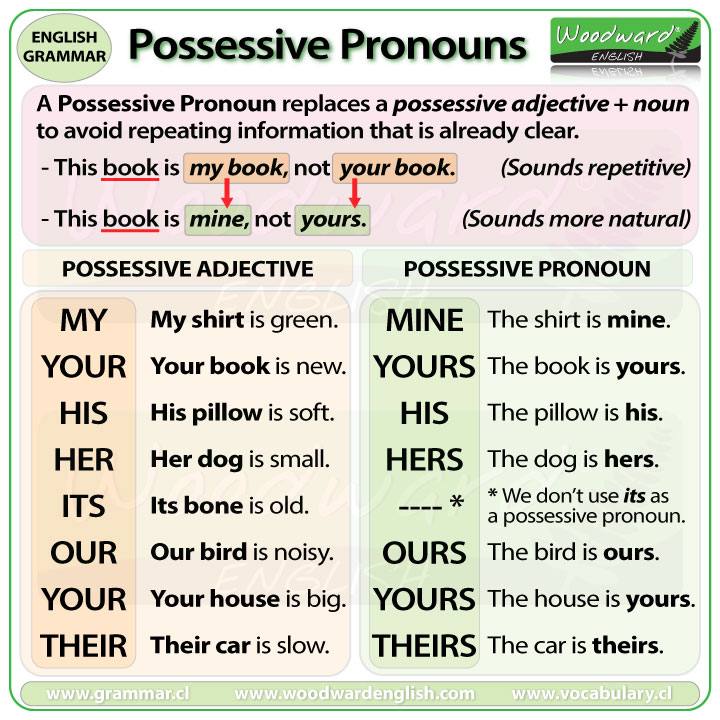Possessive Adjectives in English
I have a book.
This is my book. (my is a possessive adjective)
The book is mine. (mine is a possessive pronoun)
What is a possessive pronoun and when do we use them?
Look at this sentence:
- This book is my book, not your book.
Here the word book is repeated three times, so it sounds very repetitive.
We already know we are talking about a book so we can replace, my book and your book with possessive pronouns.
We can say:
- This book is mine, not yours.
Mine replaces my book.
Yours replaces your book.
Now it doesn’t sound repetitive. It sounds more natural.
Mine and Yours are possessive pronouns.
A possessive pronoun replaces a possessive adjective + noun to avoid repeating information that is already clear.
Look at these sentences:
- This is my
- These are my
In the second sentence books is plural. Notice how the possessive adjective MY does not change when it comes before a singular noun or plural noun. It is always the same.
How can we change these sentences to include a possessive pronoun? They become:
- This is mine.
- These are mine.
Again, you can see there is no change.
Possessive pronouns also only have one form. It doesn’t matter if they refer to one thing or more things. They always remain same.
We cannot say: These are mines. This is NOT correct.
Possessive Adjectives vs. Possessive Pronouns
Let’s compare sentences with possessive adjectives and possessive pronouns together.
- My shirt is green. — The shirt is mine.
- Your book is new. — The book is yours.
- His pillow is soft. — The pillow is his.
- Her dog is small. — The dog is hers.
- Its bone is old. — There is no possessive pronoun for IT. We don’t use ITS as a possessive pronoun.
- Our bird is noisy. — The bird is ours.
- Your house is big. — The house is yours. (Remember, your can be used to refer to one YOU or two You + You)
- Their car is slow. — The car is theirs.

More examples sentences with possessive pronouns:
- Please give this dictionary to Susan. It is hers.
What does hers refer to? In this case hers = her dictionary.
- We can eat all of the food. It’s ours.
What does ours refer to? In this case ours = our food.
- I found his passport but not mine.
What does mine refer to? In this case mine = my passport.
- Are these Alice’s keys or yours?
What does yours refer to? In this case yours = your keys.
- Excuse me, those seats are ours.
What does ours refer to? In this case ours = our seats.
- This is Jack’s wallet and I think this watch is his too.
What does his refer to? In this case his = his watch.
Possessive pronouns don’t always go at the end of a sentence. They are also common near the beginning of a sentence, especially when you are answering a question.
- Are these your shoes? No, mine are in my bag.
Here mine refers to my shoes.
- Is this Vicky’s dress? No, hers is black.
Here hers refers to her dress.
- Which bag is yours? Mine is the blue one.
Notice how in the last example there are two possessive pronouns. Yours in the question and Mine in the answer.
Here yours refers to your bag and mine refers to my bag.
Possessive Pronouns – Practice Exercises
Complete the following sentences with the correct possessive pronoun.
- The gloves belong to Mary. They are _____. (hers)
- Their meals have arrived but we are waiting for _____. (ours)
- Those aren’t my keys. _____ are in my pocket. (mine)
- This book is _____. It has your name on it. (yours)
- The house belongs to Jack and Jill. It is _____. (theirs)
- Ange and I have a new car. It is _____. (ours)
- Is this Phillip’s pen? No, it’s not _____. (his)
- It isn’t my phone because _____ (mine) is at home.
The answers appear in our video.
